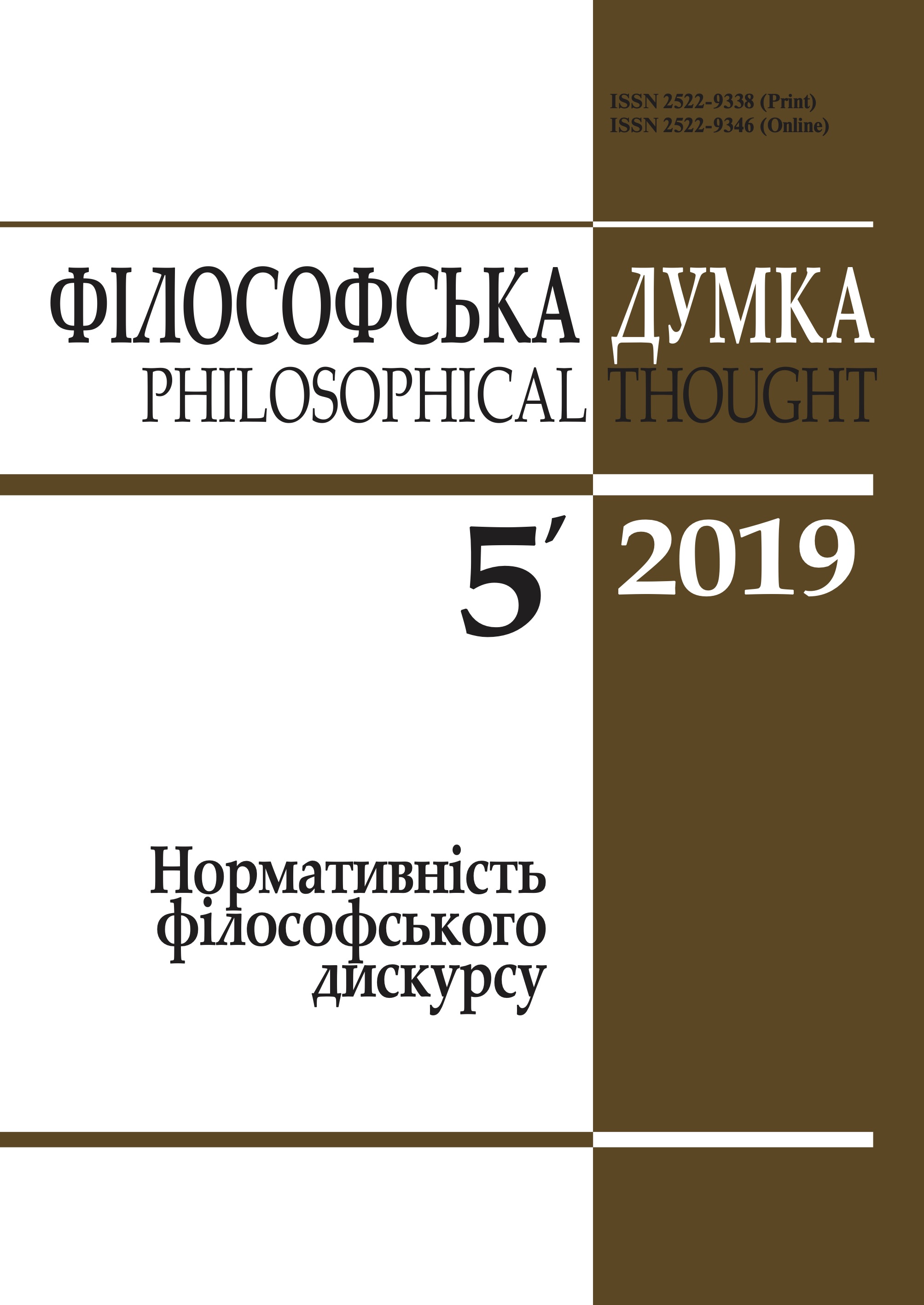Philosophical discourse: Communication and Norm
DOI:
https://doi.org/10.15407/fd2019.05.029Keywords:
philosophy, normativity, discourse, communication, lifeworld, context, positionAbstract
The situation of public functioning of philosophy today is being fundamentally changed in comparison with it that even was by the end of last century. The new opportunities of free appeal to philosophical concepts and meanings and their use by every participant of unlimited networks of open communication raise issues of preservation and protection of normative philosophical discourse. The author formulates the need in such normativity as an issue of difference between the context of reproduction and the innovation one or as interdependence of reproduction and elaborating interpretation of normative meanings in philosophy. He takes attention to highlighting the issue of making and recognizing normativity in discourse/communicative practices that could be find out in works of Michel Foucault and Jurgen Habermas. It helps to clarify a role and place of validity claims in communication actions including their meaning in philosophical discourse. Following Habermas’ theory of both linguistic and contextual depending of discourse’s normative meanings the author pays particular attention to meaning creation role of lifeworld as a cultural context that determines communicators’s understanding. It gives an opportunity to point out a principle role of communicator’s position or his or her self-understanding the lifeworld context they embodied. It also makes it possible to demonstrate clear examples of inconsistency of philosophical discourses depending on the position taken by a philosopher as we can meet radical critical position of Roger Scruton in his assessment of many prominent European philosophers’ works. In conclusion the author stresses on dependence of capacity to get added interpretation value in philosophy not only from a level of theoretical knowledge, but from his or her personal appropriation of own horizon of cultural meanings. Following Habermas's theory of linguistic and contextual dependence of normative values of discourse on context, the author draws attention to the role in the creation of values of the lifeworld as a cultural context that determines the participant's understanding. It gives an opportunity to point out a principle role of communicator’s position or his or her understanding the lifeworld context they embodied. It also allows to demonstrate clear examples of inconsistency of philosophical discourses depending on the position taken by a philosopher as we can meet in radical critical position of Roger Scruton within his assessment of many prominent European philosophers’ works. In conclusion the author stresses capacity to get added interpretation value in philosophy depends not only on a level of theoretical knowledge a person owns, but from his or her personal appropriation of own horizon of cultural meanings.
References
Dreyfus, H.L., Rabinow, P. (1982). Michel Foucault: Beyond Structuralism and Hermeneutics (pp. 143-67). Brighton: Harvester.
https://doi.org/10.7208/chicago/9780226154534.001.0001
Habermas, J. (2001). On the Pragmatics of Social Interaction. Preliminary Studies in the Theory of Communicative Action / tr. by B. Fultner. Cambridge, Massachusetts: The MIT Press.
Habermas, J. (1994). The Critics of Reason as an Unmasking of the Human Sciences: Michel Foucault. In: Critique and Power. Recasting the Foucault / Habermas Debate / Ed. by M. Kelly. Cambridge, Massachusetts; London: The MIT Press.
Habermas, J. (1989). The Theory of Communicative Action. Vol.2. Lifeworld and System: a Critic of Functionalist Reason / Tr. by Th. McCarthy. Doston: Beacon Press.
Habermas, J. (2003). Truth and Justification / Ed. by B. Fultner. Cambrige, Massachusetts: Polity Press.
Lyotard, J.-F. Why Philosophize? (2013). Cambridge: Polity Press.
Discourse (s.a.). In: Online Etymology Disctionary. Rettrieved from: https://www.etymonline.com/word/discourse
Philosophy of Communication / Ed. by G. Briankle, Ch. and G.C. Butchart (2012). Cambridge, Massachusetts; London: The MIT Press.
Scruton, R. (2015). Fools, Frauds and Firebrands. Thinkers of the New Left. Bloomsbury; London; Oxford; New York.
Weedon, C. (1987). Feminist Practice and Poststructuralist Theory. Boston: B. Blackwell.
Downloads
-
PDF (Українська)
Downloads: 847
Published
How to Cite
Issue
Section
License
Authors who publish with this journal agree to the following terms:
- Authors retain copyright and grant the journal right of first publication.
- Authors are able to enter into separate, additional contractual arrangements for the non-exclusive distribution of the journal's published version of the work (e.g., post it to an institutional repository or publish it in a book), with an acknowledgement of its initial publication in this journal.
- Authors are permitted and encouraged to post their work online (e.g., in institutional repositories or on their website) prior to and during the submission process, as it can lead to productive exchanges, as well as earlier and greater citation of published work (See The Effect of Open Access).


